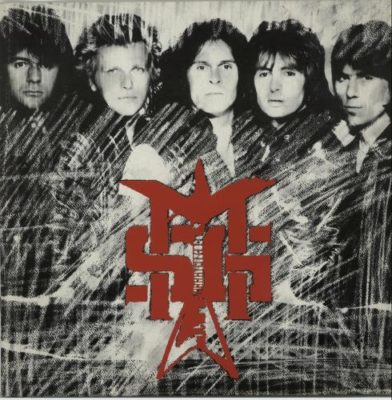One sign you that you had overbearing egotist parents is that you have “Junior” after your name. Maybe a similar rule applies to rock bands that are titled “[Frontman’s Name] Group”.
Michael Schenker is known for his guitar skills, as well as his turbulent personality. He’s fortunate that he had most of his crack-ups in the days before social media: otherwise he’d be the heavy metal Kanye West: 30% musician, 70% source of amusement.
We’re talking stints in rehab, near homelessness, hunger strikes, feuds with with singers and producers and journalists and his own brother, cancelled tours, and a long list of other bizarre behavior.
Wikipedia advises me that forty-one musicians have played in Michael Schenker Group and have since quit or been fired. Schenker would probably fire himself from his own solo project, were such a thing were possible.
But he’s definitely brilliant. I listened to power metal for years, and one thing I’d always heard was that the style’s guitar playing owes a lot to Schenker. This is correct. There’s a straight line between most of what Schenker plays on this album and Helloween, and in the case of “On and On” – with its harmonized bends and cod-Bach synthesizer lines – it’s not even a line, it’s a dot.
This is one of the best-produced 80s albums I’ve heard, particularly the deep, thudding character of the drums. MSG has a real sense of precision and space in its mix, with everything built on top of each other like layers on a cake. It’s like you can throw a fishing line into the album and find where the vox are, where the guitars are, where the drums are, etc. Listening to MSG is a seriously good time before you even appreciate the notes.
“Ready to Rock” is an okay-ish cock rock anthem. “Attack of the Mad Axeman” seems like more of the same…but then Schenker pulls a drag-chute on the song and turns it into something adventurous and fascinating. His shredding over the final 32 or so bars…you are listening to power metal, at least five years before. Seriously revolutionary stuff.
“On and On” continues down this path, trading ethereal keys for smoldering wah pedal soloing. I’m struggling to think of more hard rock/heavy metal from 1981 that sounds like this. The Michael Schenker Group was an odd band: they didn’t sound out of place on MTV, but on a compositional level they had a quality that nobody else really possessed. Some quality of uncaring naffness and unfocused coolness.
“Let Sleeping Dogs Lie” and “I Want More” are forgettable. “Never Trust a Stranger” is the power ballad, and sounds like Elton John covered by Aerosmith. “Looking for Love” is a burning and agitated uptempo track with some great hooks and guitar moments. The final track is pretty good too, except for when the music drops away and they let Gary Bardem sing unaccompanied. He’s one of those guys who sounds great, but only if he’s located somewhere in a pile of 200 watt Marshall stacks.
No Comments »
Quick question: how many people live in Australia? About twenty-five million?
That’s right, but also wrong. Twenty-five million people don’t live in Australia; they live in Sydney, Brisbane, Melbourne, Darwin, Adelaide, and Perth.
Leave the coastal enclaves and Australia quickly becomes indistinguishable from Mordor: arid bush, thinly grassed plains, and huge expanses of sand that can only be described as wastelands. Australia has ten deserts – new ones were still being discovered two hundred years after white fella made landfall – and they’re every color you can name. The Simpson Desert is blood-red. The Tanami Desert is orange. The Painted Desert (which contains mica) is white streaked through brown. Australians might run out of water, oil, coal, and food, but we will never run out of deserts.
Only fourteen percent of Australians live in remote areas…remote areas that are virtually the entire country. This has engendered an endless and tiresome “cultural dialog” about who the real Australians are – the majority packed into urbanities engineered to look like their European countries of origin, or the minority who actually live in Australia.
Wake in Fright is a particularly nightmarish depiction of life in the Australian outback. The main character is a schoolteacher, posted out to some flyspeck town, who has just received his Christmas pay packet. He obviously intends to return to Sydney. Citydwellers view the outback like astronauts view the vacuum of space: a cool experience, but you don’t stay past the airlock a second longer than you have to.
En-route, he stops for the night at the slightly larger flyspeck town of Bundanyabba (modelled after the real town of Broken Hill). Everyone – police, bartenders, miners – is superficially friendly in a way that’s scary, as though they’re all wearing masks. The town has secrets hidden in plain sight: moral depravity, suicide, and sexual corruption. After nightfall the schoolteacher goes out to gamble, and loses all of his money. He is now dependent on the town’s generosity to survive, and the masks start to slip.
Like Picnic at Hanging Rock, Wake in Fright was written in the 1960s, and achieved international fame through a movie. After this, the similarities end. Picnic was oneiric and hallucinatory, Wake is blunt and stark. Hanging forces you maddeningly far away from itself, In draws you close. Rock is delicately ladylike, Fright is like watching a blood and shit covered tapeworm being pulled out with tweezers from a diseased cat’s asshole.
It’s a really vile book. There’s a scene in the middle as unpleasant as anything I can recall reading, and unlike American Psycho it accomplishes this without becoming a cartoon. Even descriptions of harmless events seem coated in filth and poison. Riding a train. Eating breakfast at a hotel. Innocent acts are seen through an authorial lens that focuses the dust-cauled Australian sunlight on dust, dirt, and unpleasantness.
There’s precisely one scene where Kenneth Cook blurs the writerly camera, obscuring the action on the page. He may have been afraid of censorship. Nevertheless, there are enough clues that you understand what’s happening.
Alcohol is the grease of the story, allowing the action to move. Everyone drinks all the time in Bundanyabba, and refusing to drink is an insult. Several times the protagonist tries to plead off the beers forced on him – there’s the sense that the town is trying to poison him – and the nice bloke offering the beer turns into a spitting viper. You have to be an alcoholic in the ‘Yabba. If you aren’t, you’re an outside.
This “get drunk or else” attitude is an authentic one. Australia is a nation of social drinkers – sometimes without the social. My father used to listen to Australian country musician Slim Dusty, who wrote dozens if not hundreds of songs about alcohol, such as “You’ve Gotta Drink the Froth to Get the Beer”, “Love to Have a Beer With Duncan”, “My Pal Alcohol,” and (most famously) “A Pub With No Beer”. “The maid’s gone all cranky, and the cook’s acting queer / What a terrible place, is a pub with no beer.”
Karl Marx described religion as “the opiate of the masses”. In rural Australia, the opiate of the masses is an actual opiate.
The outback doesn’t come off looking very good in Wake in Fright. It would be considered racist if it was set in a place where the people are black or brown instead of white (as happened with Dan Simmons’ Song of Kali, and Billy Hayes’ Midnight Express). To what extent it’s modeled on reality isn’t for me to say – I’m not sure that Broken Hill was ever the antipodean Gomorrah that Bundanyabba is. But there’s romantic depictions of outback life (“Waltzing Matilda”) that seem equally alien to me, based on my limited exposure to outback towns. Maybe the needle lies somewhere in between. Maybe I am fervently planning on never finding out where.
No Comments »
“Hey, it’s ya boiiiiii. Thanks for the 200 bits, cancerfart420. Holy shit, these queue times are seriously pepega. I just wanna frag out, man. Okay, my team’s here. PogU. Ready to get carried, boys? Here we go.
“Oh my God. That guy was trash. Trash. Terrible. Complete dogshit. The only reason he killed me was because I missed my shots and he hit his shots. Literally, that’s the only reason he beat me. If I hit my shots and he missed his, he’d be dead. That’s how trash he is.
“Holy shit, that gun keeps melting me. Nerf that shit already. I asked a dev about adding some extra bloom to the recoil pattern, and he said they’d consider it. That’s right. I talk to game devs on Twitter. No kappa. You won’t hear me mention it, though, I keep that fact on the down-low.
“This kid’s aim is feelsweirdman. I don’t want to be that guy, but could he be…hacking? Okay. That does it. I’m spectating this little shit. Oh, look, he has “TTV” in his name. I’m not telling you to go to his Twitch stream and bully him. I’d get banned if I did that. All I’ll do is insinuate that he’s hacking and then loudly read his Twitch handle to my viewers.
“Goddamn, I’m actually whiffing everything. Okay, I’m changing my mouse sens again. Please watch me for 5 minutes while I do this. This is now a tech support stream. Wait, why does my mouse have “CPI”? Is that the same thing as “DPI”? Can someone tell me? Also, why aren’t my stream alerts working? I need my chat to diagnose and fix everything wrong in my entire life.
“This is gonna be a huge nade. Huge. Kobe. Do you know that ‘kobe’ means a grenade thrown with accuracy and precision while ‘yeet’ means a grenade thrown with raw power ? I’m sure this is the first streamer you’ve ever seen explain this. Glad to help educate y’all.
“Okay, I see some little kids causing trouble in chat. Where are my mods? For the last time, I’m not a racist. All I did was call a black teammate a monkey and tell him to get back to Africa. How’s that racist? Technically we’re ALL monkeys and we ALL come from Africa. Try reading a book sometime, 4head. Anyway, that incident happened fifteen whole days ago, and I apologised for it. Yes, you heard me. Even though I did nothing wrong and was 100% in the right, I still apologized. That’s the kind of guy I am.
“Just drop it. I’m not here for drama. I just come on here to chill with you guys and to spread positive vibes. Yo, thanks for the 500 bits. My boy cancerfart420 going crazy today.”
No Comments »



